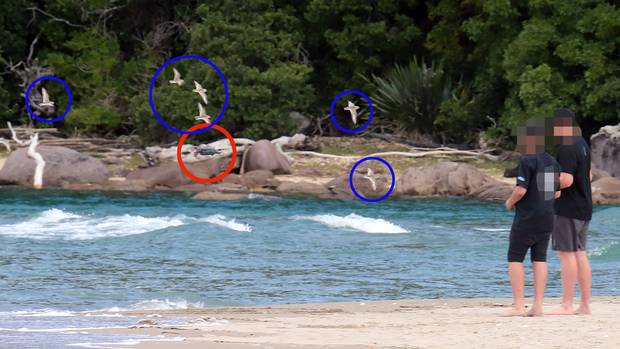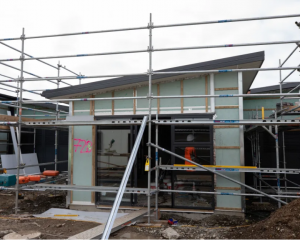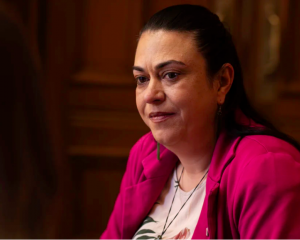
Cameron Scott captured the image at the Whangamatā Estuary earlier this month and said two young men were flying a drone ''directly in front of the roped-off section of beach by the estuary, which supposedly protects the endangered dotterel birds''.
He said six dotterels were flying around and pretty distressed.
''This kind of behaviour seems to me to be incredibly stupid. It's really foolish and shows just how ignorant some people are of the need to protect these birds.''
A Department of Conservation spokeswoman said the boys were standing about 20 metres away from a dotterel nesting site.
People could be prosecuted if they were found to be disrupting the birds as they were highly protected under the Wildlife Protection Act and you needed a permit from the department to fly a drone on New Zealand's public conservation land or near marine mammals.
It was breeding season and drones could affect dotterel populations, she said.
''They think the drone is a predator, and leave the nest and/or chicks unprotected as they try to lead the drone away from the nest/chicks. This can cause eggs to either overheat due to the sun or in cooler months cool or lay unprotected and be taken by a blackback gull, who are one of the main predators of dotterels and can clear out a nest in seconds.''
Dotterel areas were very well signposted, with plenty of signage at key sites and DOC wardens informing the public of nesting areas that were also roped off, she said.
''These sites are managed by DOC dotterel rangers with a network of local volunteer 'dotterel minders' who have been doing the work for years and are passionate about the dotterels.''
Whangamatā Dotterel Minders member Graeme Webb said it was disappointing but the boys may not have realised the anxiety they were causing the birds.
Mr Webb said pairs of dotterels would tackle predators much larger than themselves.
Thames-Coromandel District Council Compliance manager Brian Taylor said drones can be flown over public land as long as the flyer is courteous of other people and animals.
But you could not operate the drone within 20 metres of sensitive wildlife habitats and nesting or roosting birds.
''We ask that people do not use them recklessly or cause a nuisance to people or animals. We work with the Department of Conservation to raise awareness about dotterel habitats and put up signage at our beaches, requiring that dogs be kept on leads around nesting areas.''
If the council received a complaint, permission to operate the drone could be revoked depending on the circumstances, he said.
''We would have a chat with the drone operator to educate them about the harm they're causing.''
However, it could not issue a fine as there was no central government legislation regulating this area, unlike dog control or freedom camping.
Dotterels
* Dotterels are classified as threatened species, and highly protected under the Wildlife Protection Act.
* There are about 2500 dotterels left nationally.
* The Coromandel region holds around a quarter of the population with about 600 dotterels.
* Whangamatā is one of the main breeding or flocking sights for dotterels, and as it is currently breeding season for these birds. The usual 12 to 14 pairs expand to 100 or more birds.
- Source Department of Conservation












